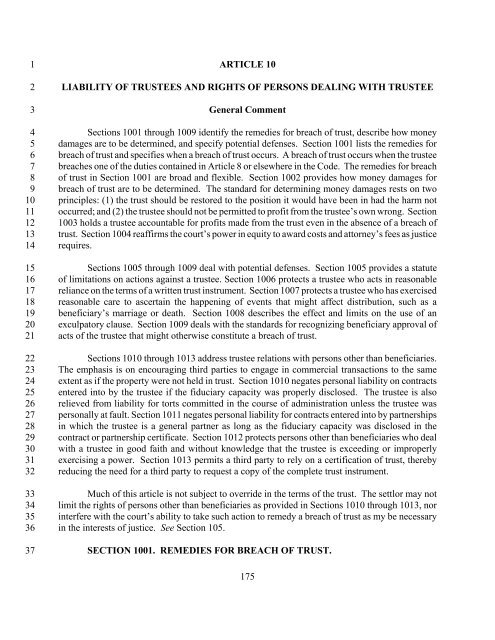uniform trust code - Kansas Judicial Branch
uniform trust code - Kansas Judicial Branch
uniform trust code - Kansas Judicial Branch
You also want an ePaper? Increase the reach of your titles
YUMPU automatically turns print PDFs into web optimized ePapers that Google loves.
1<br />
2<br />
3<br />
4<br />
5<br />
6<br />
7<br />
8<br />
9<br />
10<br />
11<br />
12<br />
13<br />
14<br />
15<br />
16<br />
17<br />
18<br />
19<br />
20<br />
21<br />
22<br />
23<br />
24<br />
25<br />
26<br />
27<br />
28<br />
29<br />
30<br />
31<br />
32<br />
33<br />
34<br />
35<br />
36<br />
37<br />
ARTICLE 10<br />
LIABILITY OF TRUSTEES AND RIGHTS OF PERSONS DEALING WITH TRUSTEE<br />
General Comment<br />
Sections 1001 through 1009 identify the remedies for breach of <strong>trust</strong>, describe how money<br />
damages are to be determined, and specify potential defenses. Section 1001 lists the remedies for<br />
breach of <strong>trust</strong> and specifies when a breach of <strong>trust</strong> occurs. A breach of <strong>trust</strong> occurs when the <strong>trust</strong>ee<br />
breaches one of the duties contained in Article 8 or elsewhere in the Code. The remedies for breach<br />
of <strong>trust</strong> in Section 1001 are broad and flexible. Section 1002 provides how money damages for<br />
breach of <strong>trust</strong> are to be determined. The standard for determining money damages rests on two<br />
principles: (1) the <strong>trust</strong> should be restored to the position it would have been in had the harm not<br />
occurred; and (2) the <strong>trust</strong>ee should not be permitted to profit from the <strong>trust</strong>ee’s own wrong. Section<br />
1003 holds a <strong>trust</strong>ee accountable for profits made from the <strong>trust</strong> even in the absence of a breach of<br />
<strong>trust</strong>. Section 1004 reaffirms the court’s power in equity to award costs and attorney’s fees as justice<br />
requires.<br />
Sections 1005 through 1009 deal with potential defenses. Section 1005 provides a statute<br />
of limitations on actions against a <strong>trust</strong>ee. Section 1006 protects a <strong>trust</strong>ee who acts in reasonable<br />
reliance on the terms of a written <strong>trust</strong> instrument. Section 1007 protects a <strong>trust</strong>ee who has exercised<br />
reasonable care to ascertain the happening of events that might affect distribution, such as a<br />
beneficiary’s marriage or death. Section 1008 describes the effect and limits on the use of an<br />
exculpatory clause. Section 1009 deals with the standards for recognizing beneficiary approval of<br />
acts of the <strong>trust</strong>ee that might otherwise constitute a breach of <strong>trust</strong>.<br />
Sections 1010 through 1013 address <strong>trust</strong>ee relations with persons other than beneficiaries.<br />
The emphasis is on encouraging third parties to engage in commercial transactions to the same<br />
extent as if the property were not held in <strong>trust</strong>. Section 1010 negates personal liability on contracts<br />
entered into by the <strong>trust</strong>ee if the fiduciary capacity was properly disclosed. The <strong>trust</strong>ee is also<br />
relieved from liability for torts committed in the course of administration unless the <strong>trust</strong>ee was<br />
personally at fault. Section 1011 negates personal liability for contracts entered into by partnerships<br />
in which the <strong>trust</strong>ee is a general partner as long as the fiduciary capacity was disclosed in the<br />
contract or partnership certificate. Section 1012 protects persons other than beneficiaries who deal<br />
with a <strong>trust</strong>ee in good faith and without knowledge that the <strong>trust</strong>ee is exceeding or improperly<br />
exercising a power. Section 1013 permits a third party to rely on a certification of <strong>trust</strong>, thereby<br />
reducing the need for a third party to request a copy of the complete <strong>trust</strong> instrument.<br />
Much of this article is not subject to override in the terms of the <strong>trust</strong>. The settlor may not<br />
limit the rights of persons other than beneficiaries as provided in Sections 1010 through 1013, nor<br />
interfere with the court’s ability to take such action to remedy a breach of <strong>trust</strong> as my be necessary<br />
in the interests of justice. See Section 105.<br />
SECTION 1001. REMEDIES FOR BREACH OF TRUST.<br />
175

















